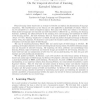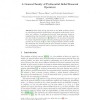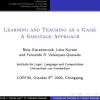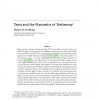LORI
2009
Springer
14 years 6 months ago
2009
Springer
LORI
2009
Springer
14 years 6 months ago
2009
Springer
Most belief change operators in the AGM tradition assume an underlying plausibility ordering over the possible worlds which is transitive and complete. A unifying structure for the...
LORI
2009
Springer
14 years 6 months ago
2009
Springer
LORI
2009
Springer
14 years 6 months ago
2009
Springer
LORI
2009
Springer
14 years 6 months ago
2009
Springer
Coalition Logic does not explicitly talk about the effects of a coalitional move on the strategic ability of the remaining players, while in Game Theory reasoning patterns involvi...
LORI
2009
Springer
14 years 6 months ago
2009
Springer
Abstract. We study games in the presence of an interaction structure, which allows players to communicate their preferences, assuming that each player initially only knows his own ...
LORI
2009
Springer
14 years 6 months ago
2009
Springer
We propose a dynamic testimonial logic (DTL) to model communication and belief change among agents with different dispositions to trust each other as information sources. DTL is ...
LORI
2009
Springer
14 years 6 months ago
2009
Springer
We introduce a new type of arrow in the update frames (or “action models”) of Dynamic Epistemic Logic in a way that enables us to reason about epistemic temporal dynamics in m...
LOPSTR
2009
Springer
14 years 6 months ago
2009
Springer
Proving termination of, or generating efficient control for Constraint Handling Rules (CHR) programs requires information about the kinds of constraints that can show up in the CHR...
LOPSTR
2009
Springer
14 years 6 months ago
2009
Springer




